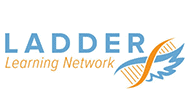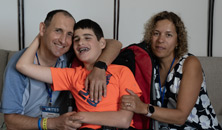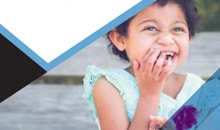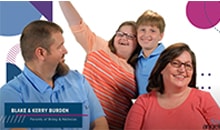
Angelman Syndrome Foundation and Dup15q Alliance partner to launch the LADDER Learning Network, showing continued dedication to research
Angelman Syndrome Foundation (ASF) and Dup15q Alliance proudly announce their strategic partnership to launch the LADDER Learning Network, a new medical network specifically designed for individuals with Angelman syndrome (AS) and dup15q—two rare disorders affecting the q-arm of the 15th chromosome.
Through its ASF Clinics and Dup15q Clinics, LADDER Learning Network connects families to more than 40 medical professionals across the globe who have extensive experience treating AS and dup15q. With 18 clinics in the United States and six partner clinics abroad, the Network includes specialists like clinical geneticists, genetic counselors, neurologists, psychiatrists, psychologists, speech pathologists, physical/occupational therapists, social workers, nutritionists and more.
“Access to high-quality medical care is key for those with AS and dup15q to thrive,” said ASF Chief Executive Officer Amanda Moore. “Through our ASF Clinics, deserving families now have access to competent and knowledgeable care teams to get the answers they desperately seek.”
“We envision a world where families, clinicians and advocates enable dup15q individuals to live life to their full potential,” said Dup15q Alliance Executive Director Carrie Howell. “Dup15q Clinics allow us to empower individuals living with dup15q syndrome by providing them access to the best medical care in the world for this disorder.”
As leaders in advancing breakthrough research and life-changing therapeutics, ASF and Dup 15q Alliance partnered to launch the LADDER Learning Network with the purpose of:
- Connecting families with experienced, highly specialized medical providers, through its ASF Clinics and Dup15q Clinics. Providers within the clinics have experience and expertise in treating these two rare disorders, which has historically been difficult for families to find.
- Connecting medical providers with one another, through monthly video calls, so they can share information about their most challenging cases.
- Connecting the industry with much needed locations to host clinical trials, with the benefits of having patients in place when they become available.
- Maintaining the LADDER Database, its global network of patient data, to ease the burden of paperwork on families.
“While Angelman syndrome and dup15q are different, the same set of medical providers often care for both populations of individuals,” said Elizabeth Jalazo, MD, and Clinic Director for LADDER Learning Network. “The combination of data collection and cross-disorder investigation is key to driving discovery.”
Both organizations are driven to provide support and clinical care to families while heavily investing in research. ASF has invested more than $12.4 million in research to date, supporting projects worldwide. This year, ASF is celebrating its 30-year anniversary of commitment to the AS community, and it plans to fund an additional $1.6 million in research in 2022. This year, Dup15q Alliance has committed 44 percent of its annual budget to research and clinics.
While the LADDER Learning Network is new, ASF has operated clinics since 2012, when it opened its first two locations in Chapel Hill, North Carolina and Boston, Massachusetts. LADDER Learning Network plans to launch four new clinics this year. Two opened in February—one at Boston Children’s Hospital and one at Children’s Hospital Los Angeles.
“The connections we’re making not only improve quality of life, but they are paving the way for possible life-transforming treatments,” Moore said. “We will continue to work hard every day to support families in their journeys.”
###
ABOUT ANGELMAN SYNDROME
Angelman syndrome is a rare neuro-genetic disorder that occurs in one in 15,000 live births (or 500,000 people worldwide). Common signs and symptoms, such as walking and balance disorders, gastrointestinal issues, seizures and speech impairments, usually appear in early childhood. It is caused by a loss of function of the UBE3A gene in the 15th chromosome derived from the mother. It shares symptoms and characteristics with other disorders including autism, cerebral palsy and Prader-Willi syndrome. It has no cure.
ABOUT ANGELMAN SYNDROME FOUNDATION
The mission of Angelman Syndrome Foundation is to advance the awareness and treatment of Angelman syndrome through education and information, research, and support for individuals with Angelman syndrome, their families and other concerned parties. We exist to give all of them a reason to smile, with the ultimate goal of finding a cure. To learn more, visit Angelman.org.
ABOUT DUP15q
Dup15q is a rare neuro-genetic disorder that is estimated to occur in one in 5,000 live births. Common signs and symptoms, such as hypotonia (poor muscle tone), epilepsy, cognitive delay, motor delays and autism, usually appear in early childhood. It is caused by duplication of a portion of the 15th chromosome. It has no cure.
ABOUT DUP15Q ALLIANCE
The mission of Dup15q Alliance is to empower individuals living with dup15q Syndrome and other related rare diseases to reach their full potential by advancing breakthrough research and life-changing therapeutic treatments, supporting families affected by dup15q and promoting advocacy.





